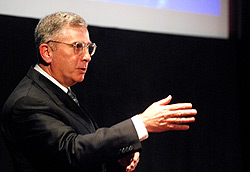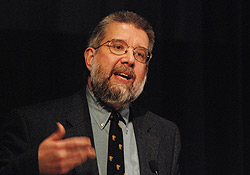Berkeleyan
Understanding the Middle East, or not
In separate Nimitz lectures, a retired top general and the former head of the CIA's bin Laden desk offer sharply conflicting views of al Qaeda, Iraq, and U.S. foreign policy
![]()
| 19 March 2008
Midway into Gen. John Abizaid's campus talk last week, a woman in the audience, accompanied by a small dog, began making her way toward the lone available exit, taking a route across the front of the Berkeley Art Museum's Grand Theater and barely a foot or so behind Abizaid himself. Seeing he'd been upstaged, the retired warrior paused to good-naturedly track the woman's progress, and the usurper meekly seized her moment of fame to flash a peace sign to the standing-room-only crowd.
"Peace," seconded the former head of U.S. Central Command, who'd already had a similar encounter with a man in an orange, county-jail-chic jumpsuit. "I'm for peace - I'm a soldier. All soldiers are for peace. You know, we'd much rather spend our time on the golf course than in the middle of Saudi Arabia."
Abizaid, the four-star general who oversaw U.S. military operations in Iraq and Afghanistan from 2003 to 2007, showed how he'd earned his reputation as the most enlightened of Army brass, stressing the need for greater understanding of the Arab world - his own grandparents were Lebanese Christian immigrants - and a greater reliance on diplomacy over military might. In the first of this year's Admiral Chester W. Nimitz Lectures, sponsored annually by the Military Affairs program, he spoke without notes as he roamed the front of the theater, working the room with a combination of erudition, humor, and easy self-assurance.
The sparks didn't fly until two nights later, when the second Nimitz lecturer took to the podium. Where the soldier was engaging, Michael Scheuer, chief of the CIA's bin Laden desk from 2001 to 2004, was combative, lacing a trenchant critique of U.S. foreign policy - which he read, somewhat stiffly, from a prepared manuscript - with derisive, comically splenetic attacks on politicians, academicians, and pundits. Where the general called for stepped-up international diplomacy, the intelligence analyst decried George H.W. Bush's restrained coalition-building during the first Gulf war, and demanded the militarization of U.S. borders to protect against terrorist threats.
And where Abizaid maintained that the U.S. is mostly on the right track in its "war on terror," Scheuer - accusing the nation's leaders of counterproductive "scaremongering" - insisted we've got it all wrong.
"We have only ourselves to blame for today's situation," asserted Scheuer, pointing to America's invasion of Iraq and its support for Israel and "Muslim tyrannies" like Egypt and Saudi Arabia. "We are, quite simply, at war because of what the United States government does under both parties in the Islamic world, and not because of how Americans think or live."
A 'long war,' fought with diplomacy
Abizaid spent half of his 34-year military career in the Middle East, culminating in nearly four years as head of the U.S. Central Command - with responsibility for American security interests in a volatile area stretching from the Horn of Africa to South Asia - beginning a few months after the U.S. invasion of Iraq until he retired last year. A fluent Arab speaker who studied at the University of Jordan in Amman, he was known as an advocate of the "long war" against Islamic extremism - a shift from short-term military actions to a comprehensive approach that is based on the needs of the Middle East and its people.
 Gen. John Abizaid (Peg Skorpinski photos) |
"There's no such thing in my mind as military force alone ever being successful," Abizaid told his audience. "There has to be a political, economic, diplomatic, informational, [and] educational piece to it that allows for synchronized and coordinated action."
Key to winning the "long war," he said, is a diplomatic resolution of the Israeli-Palestinian conflict, which "creates a fertile recruiting ground for groups such as al Qaeda and others that move to the extremes." People on both sides of the conflict, he said, "want this cycle of violence to cease, and they actually are more involved with trying to find a solution today than they have been in many, many years."
"It will be very important," Abizaid said, "as our new president takes office in January, that he or she comes to the conclusion that they need to apply American diplomatic efforts at the beginning of the term, and not at the end of the term like we traditionally do."
He also linked America's problems in the region to its dependence on oil, asserting that the need for Middle East petroleum "has kept me fighting out here for half my career, and has kept nearly 2 million Americans in and out of here for the past seven years."
And while he said a military strike against Iran - the issue that appears to have led to the sudden resignation of his successor at Centcom, Adm. William Fallon, earlier in the day - should be "a course of last resort, not a course of first resort," he counseled continued patience on the eve of the fifth anniversary of the March 20, 2003, Iraq invasion. "We kid ourselves that there's an easy path ahead in Iraq," he said, adding that the U.S. will need to provide "some amount of military help" for it to grow "from a very, very weak and nearly failed state to one that is able to take its rightful place in this part of the world."
"I also believe that by operating in the Middle East and confronting al Qaeda on its territory in the way we have, that we have probably kept ourselves safer here at home," said Abizaid, an early supporter of the Iraq invasion. Echoing a widely held view, he characterized al Qaeda as "a movement not unlike fascism in the early days of the 1920s or Bolshevism in the early 1900s," a nascent ideology struggling for ascendancy in the region.
"If, in the period between 1925 and 1932, we had stood up to the rise of Hitlerism, we had stood up to the rise of fascism in Europe, we had taken some actions necessary to turn the ideological tide in Europe, we might have avoided World War II," he said. "If we ever go to war with this part of the world, it will cost hundreds of millions of lives."
Deliberate lie, or debilitating fantasy?
Scheuer, however, ridiculed the notion of the war on terror as one of ideas, a struggle to defeat an ideology intent on replacing democracy with a worldwide caliphate based on Islamic law. "Those fostering fears of the caliphate's imminent return," he said, "are either ignorant of the Islamic world and its history, or deliberate liars."
 Michael Scheuer |
Scheuer, a 22-year CIA veteran and the author of three books - the New York Times called his latest, Marching Toward Hell, a "scathing, wildly uneven, and often intemperate work" - characterized fears of "Islamofascism" as a bogeyman, propagated by Western leaders unwilling to reassess their support for Israel and the "fascist governments" backed by the U.S.
"That al Qaeda and other Islamist groups are authoritarian and anti-secular cannot be doubted," said Scheuer, who left the CIA in 2004. "That they would be brutal on gaining power is also a given. But to portray them as communist totalitarians or Nazi fascists is either a deliberate lie or a debilitating fantasy."
Proponents of such a view, he said, "are trying to breathe new life into the long-dead world with which they are most familiar" - namely World War II and the Cold War - and avoiding "the need for hard thinking about the changed nature of today's world" and what it will take to defeat Muslim extremists. Moreover, he said, likening today's terrorists to fascists and communists "lets us blame the war entirely on our Islamist foes."
In fact, Scheuer maintained, "Our enemies are motivated by what we do, not who we are and what we think." Without America's help, he said, al Qaeda could not have become such a potent antagonist.
It is U.S. policy, he said, "which bin Laden and others have persuaded Muslims to see as the indispensable prop that keeps in power Islam's most lethal enemies - Israel and the Arab police states like Saudi Arabia, Jordan, and Algeria."
Iraq, especially, has been an enormous boon to al Qaeda, he said. "In 2001, after 20 years of effort, bin Laden had only partially succeeded in making U.S. foreign policy the central focus of Islamist animosities," argued Scheuer. "It was only the U.S. invasion and occupation of Iraq that made bin Laden's argument universally plausible, and nearly irresistible, for Muslims."
Saddam Hussein was "our single most important de facto ally against the Sunni Islamists," he said, "the cork in the neck of the bottle." By invading Iraq, "we popped the cork out of the bottle, and now these boys have moved 2,500 kilometers west" from their strongholds in Southwest Asia, posing a heightened threat to Israel and thus reducing the likelihood that even a Democratic president will end our military presence there.
Scheuer agreed with Abizaid on the need to reduce America's dependence on foreign oil, advocating a transition to alternative energy sources, including nuclear power. But he was largely dismissive of diplomacy, suggesting instead that the U.S. change its military rules of engagement to allow "an approach so destructive that local populations will demand peace." This, he explained, "means getting serious in Iraq and Afghanistan - getting brutal and effective, or getting out."
But nowhere was his muscular, unsentimental take on foreign policy - as well as his delight in skewering America's political leaders - more evident than in his regret over Margaret Thatcher's removal as British prime minister shortly before 1991's Operation Desert Storm, when Saddam was forced out of Kuwait but allowed to remain in power by coalition forces.
"And so," concluded Scheuer, "the only man in our coalition disappeared. No one was there to strengthen the first Mr. Bush's backbone and finish the job."

